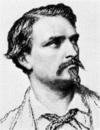Книга: Mistral Frederic «Memoirs of Mistral»

|
Серия: "-" Книга представляет собой репринтное издание. Несмотря на то, что была проведена серьезная работа по восстановлению первоначального качества издания, на некоторых страницах могут обнаружиться небольшие "огрехи" :помарки, кляксы и т. п. Издательство: "Книга по Требованию" (2011)
Купить за 1315 руб в My-shop |
Другие книги автора:
| Книга | Описание | Год | Цена | Тип книги |
|---|---|---|---|---|
| Mireille, Poeme Provencal De Frederic Mistral (French Edition) | Книга представляет собой репринтное издание. Несмотря на то, что была проведена серьезная работа по… — Книга по Требованию, - Подробнее... | бумажная книга | ||
| Lo Poema Del Rose (Spanish Edition) | Книга представляет собой репринтное издание. Несмотря на то, что была проведена серьезная работа по… — Книга по Требованию, - Подробнее... | бумажная книга |
Mistral, Frédéric
Mis·tral (mĭ-strälʹ, mē-), Frédéric. 1830-1914.
* * *

* * *
* * *
Источник: Mistral, Frédéric
См. также в других словарях:
Mistral, Frédéric — Mis·tral (mĭ strälʹ, mē ), Frédéric. 1830 1914. French writer and leader in the revival of Provençal as a literary language. He shared the 1904 Nobel Prize for literature. * * * born Sept. 8, 1830, Maillane, France died March 25, 1914, Maillane… … Universalium
French literature — Introduction the body of written works in the French language produced within the geographic and political boundaries of France. The French language was one of the five major Romance languages to develop from Vulgar Latin as a result of the … Universalium
Pablo Neruda — Born Neftalí Ricardo Reyes Basoalto July 12, 1904(1904 07 12) Parral, Chile Died September 23, 1973(1973 09 … Wikipedia
Volodia Teitelboim — Volodia Valentín Teitelboim Volosky (March 17, 1916 January 31, 2008) was a Chilean lawyer, politician and author.Born in Chillán to Jewish immigrants (Ukrainian Moises Teitelboim and Bessarabian Sara Volosky), Teitelboim was interested in… … Wikipedia
Latin American literature — Introduction the national literatures of the Spanish speaking countries of the Western Hemisphere. Historically, it also includes the literary expression of the highly developed American Indian civilizations conquered by the Spaniards. Over … Universalium
France — /frans, frahns/; Fr. /frddahonns/, n. 1. Anatole /ann nann tawl /, (Jacques Anatole Thibault), 1844 1924, French novelist and essayist: Nobel prize 1921. 2. a republic in W Europe. 58,470,421; 212,736 sq. mi. (550,985 sq. km). Cap.: Paris. 3.… … Universalium
